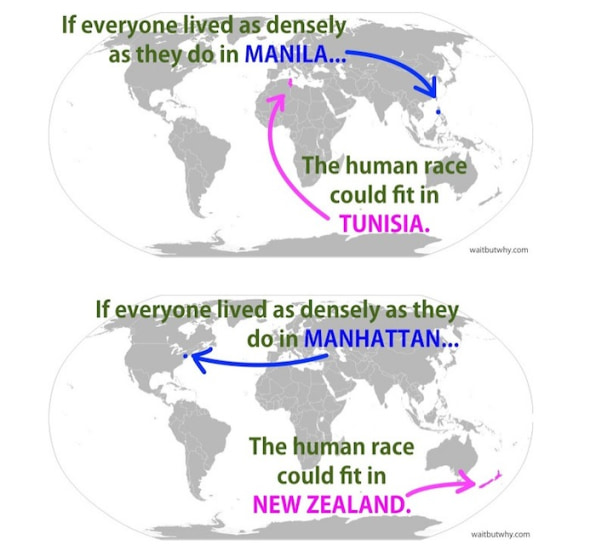Earth’s dwindling resources can’t possibly support 7 billion people.
www.youtube.com/watch?v=WGcE3ZWBjfo
Sent from my iPhone
www.youtube.com/watch?v=WGcE3ZWBjfo
Sent from my iPhone
Earth’s dwindling resources can’t possibly support 7 billion people.
www.youtube.com/watch?v=WGcE3ZWBjfo
Sent from my iPhone
here is the missing video.Sorry, the video does not show. However, people have been making the same claim for the last five decades and we still haven't run out of anything.
It already does quite comfortably. Just another "The Population Bomb".Earth’s dwindling resources can’t possibly support 7 billion people.
www.youtube.com/watch?v=WGcE3ZWBjfo
Sent from my iPhone

We're growing Geometrically. The population of the planet has a little more than doubled since I was born. This has not happened in a lifetime, before.
The Greenies should stop peddling this tripe that Earth is "overpopulated". It is nothing of the sort. In terms of the human population, Earth is incredibly sparsely populated.

“Food: there isn’t enough!” Since the time of Thomas Malthus, who lived in the early 1800s, doomsayers have gloomily predicted that mankind would outbreed its food supply, resulting in catastrophic famines. Yet the world currently produces enough food to feed 10 billion people, and there are only 7 billion of us. That is, with 7 billion human minds at work, we produce enough food for 10 billion human bodies.[1] Imagine how much food we can produce with 10 billion minds!
“But there are still hungry people in the world!” Yes, hunger remains a problem in some parts of the world, but it is not caused by the number of people. Commenting on the recent Somali famine, Oxfam, an international humanitarian organization, stated, “Famines are not natural phenomena, they are catastrophic political failures.”
“We are running out of water!” The earth is awash in water. Oceans cover 70 percent of the planet’s surface to an average depth of 6,000 feet. That’s why the earth looks blue from space. You cannot use up or destroy water; you can only change its state (from liquid to solid or gas) or contaminate it so that it is undrinkable.
“That’s a great theory, but if I’m thirsty, theory doesn’t mean much to me. There is not enough fresh water for everyone!” There is! Since 1900, freshwater withdrawals (i.e. production of usable water) have increased much faster than the human population has increased. Freshwater withdrawals have increased seven-fold since 1900 while the world population has increased only four-fold.[2] This suggests our ability to access usable water increases faster than population growth.
“Tell that to the people living in the Sahel!” You’re correct, lack of water is a serious humanitarian issue. But it is not an overpopulation issue. Water, although plentiful, can be difficult to move to those who need it, hence local water scarcity. As Karen Bakker (2003) states: “Water is one of the heaviest substances mobilized by human beings in their daily search for subsistence….Water is expensive to transport relative to value per unit volume, requiring large-scale capital investments in infrastructure networks which act as an effective barrier.” In other words, we need more dams, canals, and pipelines, not more abortion, contraception and sterilizations.
“But we’re growing exponentially!” Um,…No. We’re not. We are growing, but definitely not at an exponential rate. In fact, our rates of growth are declining. Between 1950 and 2000, the world population grew at a rate of 1.76%. Between 2000 and 2050, it is expected to grow by 0.77 percent.[3] So yes, because 0.77 is greater than zero, it is a positive growth rate, and the world population will continue to grow.
Most of this growth will come from developing countries—their life expectancies are expected to shoot up in the next 50 years, contributing to their population growth. Africa’s growth is not something to worry about.
https://www.pop.org/debunking-the-myth-of-overpopulation/
It already does quite comfortably. Just another "The Population Bomb".
The great things about having Alzheimer's is that I only need one book in my library and everyone I meet is my house is someone new.What dwindling with you is what's between the ears.. ya alzheimer's afflicted fukk
Chicks in the future are gonna dig the guy who doesn't eat synthetic meat at home...
Is this another one of those sex robot things?